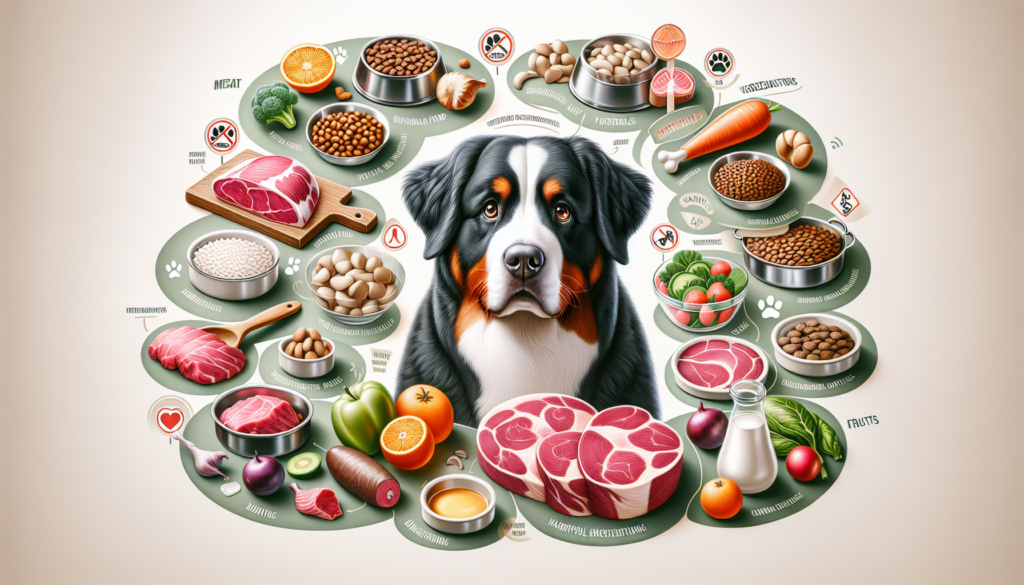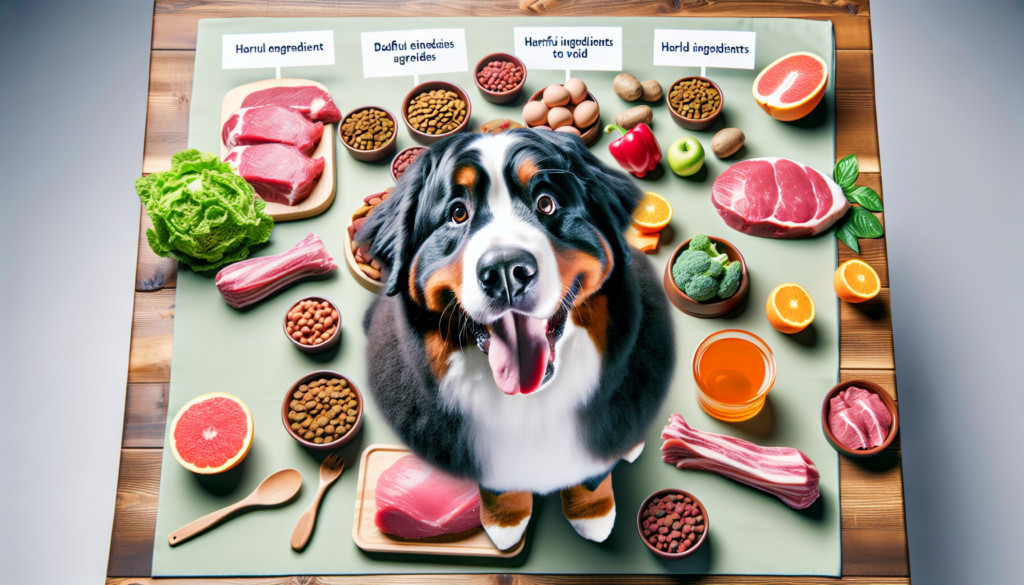Have you ever wondered what to feed your Bernese Mountain Dog to keep them happy and healthy? Well, you’re in luck! In this article, we’ll explore the dietary needs of Bernese Mountain Dogs and provide you with some helpful tips on what to include in their meals. From the importance of balanced nutrition to the best types of food, we’ve got you covered. So, keep reading to discover how you can ensure your furry friend is getting the nourishment they need for a long and vibrant life.
Feeding Your Bernese Mountain Dog
Feeding your Bernese Mountain Dog a balanced and nutritious diet is essential for their overall health and well-being. As a responsible pet owner, it is important to understand the nutritional needs of your Berner and consult with a veterinarian to ensure they are getting the right type and amount of food. With a variety of commercial dog food options available, as well as the option to follow a raw or homemade diet, it can be overwhelming to decide what to feed your Bernese Mountain Dog. In this article, we will explore the different options and discuss the specific dietary requirements for Berners, helping you make an informed decision about your dog’s nutrition.

Understanding the Nutritional Needs of Bernese Mountain Dogs
Bernese Mountain Dogs are large and active breeds, known for their strength and agility. To support their growth, maintain muscle mass, and provide them with the energy they need, it is crucial to feed them a diet that is high in quality protein, carbohydrates, and fats. Additionally, Berners require an adequate amount of vitamins and minerals to promote a healthy immune system, strong bones, and a shiny coat. Understanding these nutritional needs is the first step towards ensuring your Bernese Mountain Dog stays healthy and happy.
Consulting with a Veterinarian
Before making any changes to your Berner’s diet, it is important to consult with a veterinarian. They will be able to assess your dog’s individual needs, take into consideration any existing health conditions or allergies, and provide tailored recommendations. A veterinarian will also help you determine the appropriate portion sizes based on your Berner’s age, weight, and activity level. They can guide you through the process of transitioning to a new food or provide guidance if you decide to follow a raw or homemade diet.
Choosing the Right Type of Food
When it comes to feeding your Bernese Mountain Dog, there are two main options to consider: commercial dog food or a raw/homemade diet. Both options have their advantages and disadvantages, and it ultimately depends on your personal preference, lifestyle, and the needs of your dog.
Commercial Dog Food
Commercial dog food is a popular choice among pet owners due to its convenience and availability. There are different types of commercial dog food available, including dry kibble, wet food, and semi-moist food. It is important to choose a high-quality dog food that is specifically formulated for large breed dogs. Look for a brand that uses real meat as the main ingredient and avoids artificial preservatives, colors, and flavors.

Raw or Homemade Diet
Some pet owners prefer to feed their Bernese Mountain Dogs a raw or homemade diet. This involves feeding them a variety of raw meat, bones, fruits, and vegetables. Advocates of this diet believe that it closely resembles a dog’s natural diet in the wild and can provide numerous health benefits. However, it is crucial to consult with a veterinarian or a veterinary nutritionist to ensure the diet is balanced and meets all of your Berner’s nutritional requirements. Proper food handling and hygiene are also key considerations when feeding a raw or homemade diet.
Specific Dietary Requirements for Bernese Mountain Dogs
As mentioned earlier, Bernese Mountain Dogs have specific dietary requirements to support their growth and overall health. Let’s take a closer look at each of these requirements:
Protein
Protein is an essential component of a Berner’s diet, as it helps build and repair body tissues and provides energy. High-quality animal-based proteins such as chicken, beef, and fish are excellent options. Make sure the protein source is listed as the first ingredient in your dog’s food. Aim for a protein content of around 22-26% in their diet.
Carbohydrates
Carbohydrates are an important source of energy for Bernese Mountain Dogs. Good sources of carbohydrates include whole grains (such as brown rice or quinoa), fruits, and vegetables. Look for dog food that contains easily digestible carbohydrates to ensure your Berner gets the energy they need.
Fats
Healthy fats are crucial for a Bernese Mountain Dog’s diet as they provide energy, aid in nutrient absorption, and support a healthy coat and skin. Opt for food that contains omega-3 and omega-6 fatty acids, which are found in fish oil or flaxseed oil. These fats promote joint health and reduce inflammation.
Vitamins and Minerals
Bernese Mountain Dogs require a wide range of vitamins and minerals to maintain optimal health. Look for dog food that is fortified with essential nutrients such as vitamin A, vitamin D, vitamin E, and minerals like calcium and phosphorus. These nutrients are crucial for bone development, immune function, and overall well-being.
Foods to Avoid
There are certain foods that are toxic to dogs and should be avoided at all costs. These include chocolate, grapes, raisins, onions, garlic, avocados, and anything containing xylitol. These foods can cause severe health issues and even be fatal for Bernese Mountain Dogs. It is best to stick to a healthy and balanced diet specifically formulated for their nutritional needs.
In conclusion, feeding your Bernese Mountain Dog a well-balanced and nutritious diet is essential for their overall health and well-being. Understanding their specific nutritional requirements, consulting with a veterinarian, and choosing the right type of food can ensure they thrive both physically and mentally. Whether you opt for commercial dog food or a raw/homemade diet, prioritize high-quality ingredients and make adjustments based on your dog’s individual needs. By providing them with the right nutrition, you can enjoy many happy and healthy years together with your beloved Berner.
